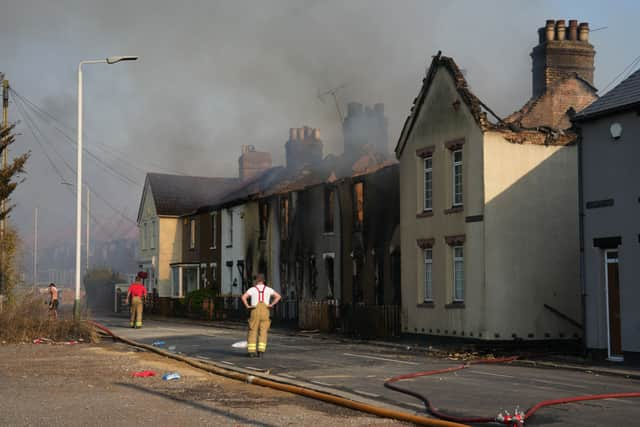Climate change: Met Office warns record-breaking summer of 2022 was ‘a sign of things to come’ for the UK
and live on Freeview channel 276
Last year’s scorching summer which saw the UK hit 40C for the first time in recorded history is "a sign of things to come" unless greenhouse gas emissions are controlled, scientists warn.
The Met Office has released a new State of the UK Climate report for 2022, detailing how the UK fared in its hottest year since records began in 1659 - and what the year 2100 will hold for Britons on our current emissions trajectory.
Advertisement
Hide AdAdvertisement
Hide AdThe report warned that temperatures rising beyond 40C, heatwaves, wildfires, summer droughts, heavy rains, flooding, and rising sea levels will all increase in frequency and severity, with 2022 seeming like a cool year compared with what it will be in 2100 if nothing changes.
Mike Kendon, climate scientist at the Met Office and lead author of its new report, told PA that when the mercury hit 40.3C in Coningsby, Lincolnshire, on 19 July last year, it was “a real moment of climate history”.


But he said on the UK's current emissions trajectory, 2022 would be considered a cool year by 2100's standards.
"This was a rare event in the context of the current climate but our extremes of temperature are changing faster than our mean temperature, and we know that climate change increases the frequency, duration and spatial extent of heatwaves."
Advertisement
Hide AdAdvertisement
Hide AdProfessor Liz Bentley, chief executive of the Royal Meteorological Society, said: “If you look at future climate projections, we are on a path to go for hotter, drier summers.
“So 2022 for me was very much a sign of things to come in future years with our changing climate.”
The Met Office report, which tracks the progress of the UK’s changing climate each year, noted that temperatures are rising above 36C more often than in the past.
– 2022 was the warmest year on record in the UK, and was 0.9C above the 1991-2020 average
– 40.3C, recorded at Coningsby, Lincolnshire, on 19 July, is the highest temperature ever recorded in the UK
– All of the UK's top 10 warmest years since 1884 have taken place since 2000
– The last decade (2013-2022) was the warmest 10-year period on record since 1659
– The number of frosty days fell 15 to 23% on the 1961-1990 average
– 2022 was also the warmest year since 1870 for sea surface temperature
– Sea levels around the UK have risen by around 18.5cm since the 1900s - 11.4cm of that happened in the last 30 years
– A warm February meant flowers and insects emerged one to 10 days earlier than they did between 1999 and 2020, on average
– Throughout the year, leaves stayed on trees seven to 16 days longer than the 1999-2021 average, because of warmer seasons either side of summer
– Five of the 10 wettest years for the UK since 1836 have occurred in the 21st century
– Between 2013 and 2022, UK winters were 10% wetter than the 1991-2020 average, and 25% wetter than 1961-1990
Between 1961-1990 the highest temperature recorded was 31.3C, between 1991-2020 it was 33.5C, and between 2013-2022 it was 35.7C. Then in 2022, it hit 40.3C.
Advertisement
Hide AdAdvertisement
Hide AdWhile summers were generally getting hotter and drier, the report said the UK was getting wetter too, with five of the 10 wettest years since 1836 taking place since the year 2000. The UK's wettest February, April, June, November and December on record have all taken place since 2009.
Data from a citizen science project called Nature’s Calendar was also included to track how plants and animals are responding to the changing seasons. Woodland Trust research scientist Fritha West said 2022 had a mild February and a warm October, which meant an early spring and a late autumn.
Leaves stayed on the autumn trees for 16 days longer than the 1999-2021 average, and many flowers started blooming and insects started emerging from hibernation days earlier than usual in the spring.
This comes as the UK government has started watering down its green policies after a narrow loss by Labour in the Uxbridge by-election was purported to have been caused by London's controversial ULEZ expansion - an environmental initiative.
Advertisement
Hide AdAdvertisement
Hide AdPolicies believed to be in the firing line included the ban on new petrol and diesel cars, energy efficiency targets for landlords, phasing out gas boilers, and low traffic neighbourhoods.
On Wednesday, the government also delayed new rules to ensure packaging producers paid for the cost of recycling their packaging will be deferred a year, from October 2024 to 2025
Comment Guidelines
National World encourages reader discussion on our stories. User feedback, insights and back-and-forth exchanges add a rich layer of context to reporting. Please review our Community Guidelines before commenting.
